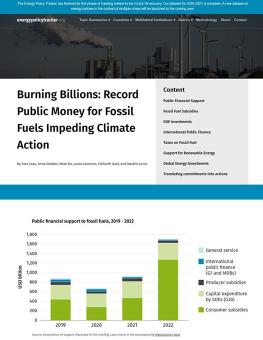
Burning Billions: Record public money for fossil fuels impeding climate action
This briefing provides the latest data on global public financial flows to fossil fuels and clean energy in advance of UN Climate Change Conference COP 28. The first four sections focus on government support for fossil fuels through subsidies, investments by state-owned enterprises, international lending from public financial institutions, and under-taxation. The final two sections summarize current data on renewable energy support and investment. Each section contains recommendations for parties to the United Nations Framework Convention on Climate Change convening at COP 28.
-
In 2022, public financial support for fossil fuels exceeded USD 1.7 trillion globally—a record high.
-
Fossil fuel subsidies in 2022 reached a record high of USD 1.3 trillion.
-
The G7 provided twice international public financing for fossil fuels (USD 20 billion) than for clean energy (USD 10 billion) in 2022.
Governments globally have made bold commitments to address climate change, yet they continue to pour billions of dollars every year into the production and consumption of fossil fuels, the single biggest contributor to the climate crisis. In 2022, public financial support for fossil fuels, in the form of subsidies, investments by state-owned enterprises (SOEs), and lending from public financial institutions, exceeded USD 1.7 trillion globally—a record high.
Under the Paris Agreement, concluded at the 21st United Nations Climate Change Conference (COP 21) in 2015, parties pledged to make "finance flows consistent with a pathway toward low GHG emissions and climate-resilient development" (Article 2.1(c)). At COP 26 in 2021, they promised to accelerate "efforts towards the phasedown of unabated coal power and phase-out of inefficient fossil fuel subsidies."
These commitments have not been achieved. In fact, the data presented in this briefing demonstrates that the gap between commitments and implementation on public financial support has become a yawning chasm.
Parties to the United Nations Framework Convention on Climate Change convening at COP 28 need to commit to phasing out all production and consumption of fossil fuels, set a deadline to shift all public financial flows from fossil fuels to more productive uses, and put in place measures that ensure fossil-dependent communities and energy consumers are supported in a just transition to clean energy.
You might also be interested in
G20 Finance Ministerials and World Bank/IMF Spring Meetings: Expert comment
G20 finance ministerials and World Bank/IMF spring meetings will take place this week in Washington. High on the agenda is the need to mobilize trillions of dollars of investment in the transition to clean energy.
Experts Call on G7 to Get Serious on Fossil Fuel Subsidy Reform
At this month’s G7 meetings, ministers need to close the loopholes and show they are serious about tackling fossil fuel subsidies.
Copenhagen Climate Ministerial: Expert comment
Around 40 climate leaders and ministers are meeting in Copenhagen from March 21 to 22 to discuss priorities for COP 29.
South African Fossil Fuel Subsidies Hit Record Highs as Country's Energy Crisis Deepens
South Africa's fossil fuel subsidies tripled between 2018 and 2023, hitting USD 7.5 billion, up from USD 2.9 billion 5 years earlier, a new report by IISD reveals.